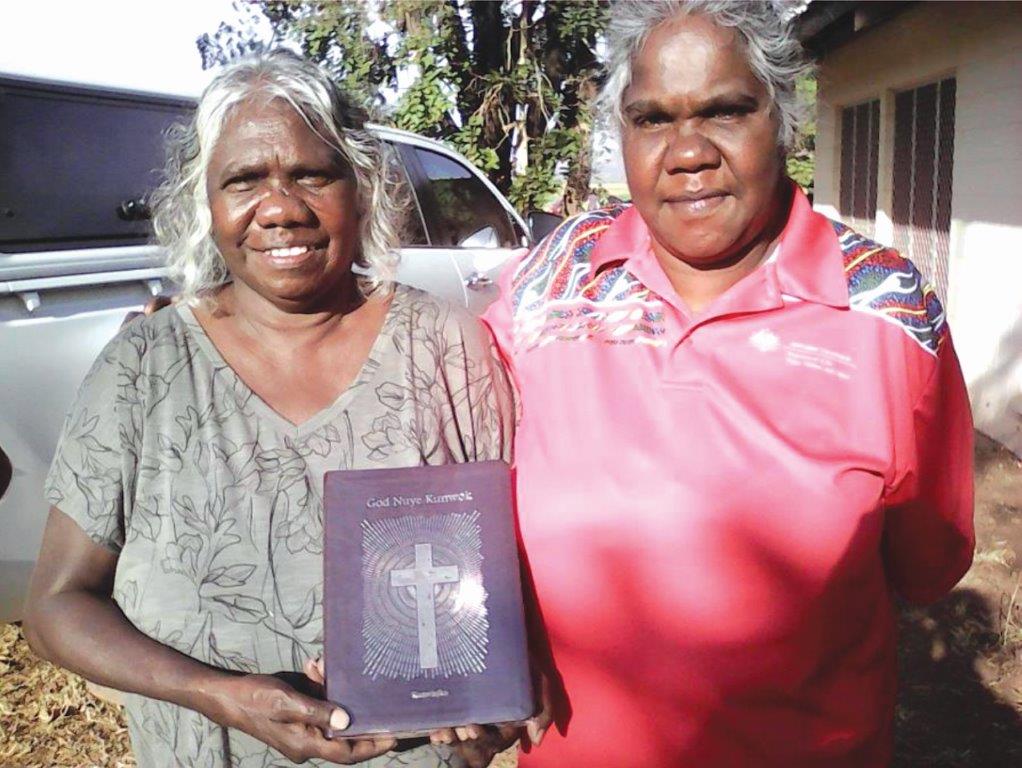Imagine if you had never read or heard the message of the Bible in your own language. That is the reality for Australia’s Indigenous community. Although more than half of Indigenous people are Christians, very few have read or heard the Bible in their ‘heart’ language.
Katrina Tjitayi is from the Pitjantjatjara community, in central Australia. She is working on a translation of the whole Bible into Pitjantjatjara.
As Katrina says, “When somebody comes talking in English, the door is closed. But when we do our language, everything spiritual is opened.”
One person who is continuing a family tradition of opening the door to faith for Indigenous people is Jonathan Harris, Bible Society’s National Manager of Church and Community Relations. According to google maps, the trip from Barraba, in northern New South Wales to Gunbalanya (formerly known as Oenpelli), in the Top End, should take about 40 hours of continuous driving. But when Jonathan arrived in the remote Northern Territory Indigenous community from his family farm in NSW, he was completing a family journey that began more than 80 years ago.
Jonathan’s grandmother, Nell Harris, spent 36 years as a missionary in the Northern Territory. In an era when colonial thinking meant that Indigenous people were often forced to forget their traditional language and speak only English, Nell was ahead of her time.
In the 1930s, Nell joined forces with a group of Indigenous women to bring the translation of St Mark’s Gospel into the ‘language of the heart’.
Sitting under the shade of a bark hut, the women would translate five verses a day. Little did Nell know that one day her work would become the Kunwinjku Shorter Bible, printed in China, shipped to Sydney and driven by her grandson to the community who had waited for eight decades for the Bible to ‘return home’.
The United Nations General Assembly has declared 2019 the International Year of Indigenous Languages. Its aim is to raise awareness of the crucial role languages play in people’s daily lives. In the small community of Gunbalanya, ‘heart’ language is alive and well.
For Jonathan Harris and members of the Gunbalanya Christian community, the delivery of the Bibles represents more than just a tribute to the work of their ancestors.
As Hagar Nadjamerrek says, it is a symbol of hope.
“This is what we need our kids to learn and to understand and to share the good news amongst our people,” Hagar says. “Not only in this community, but sharing out to other communities, other families.
“This is our future.”
You can help the Bible Society Australia continue the work started 80 years ago in a dusty bark hut in a remote Indigenous town. Currently, there’s only one full Bible in an Aboriginal language. This means thousands of Christians are missing out on God’s word.
To donate to help Indigenous Christians share the Bible their way, in their words visit biblesociety.org.au/projects/australia-indigenous
Hagar and Donna Nadjamerrek
Top image: Hagar Nadjamerrek (left) says the delivery of the Bible written in her ‘heart’ language is a symbol of hope.
